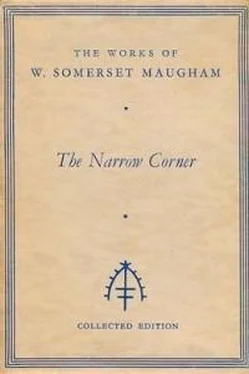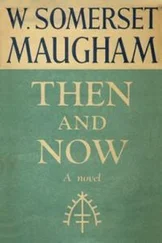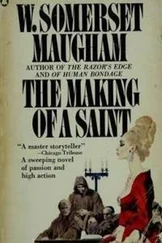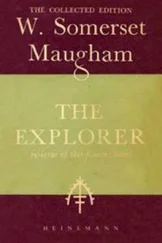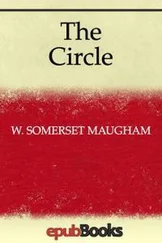But the doctor, exquisitely at peace, considered the riddle of existence. His body rested in the long chair so comfortably that he was not conscious of it except in so far as an obscure sense of well–being in it added to his spiritual relief. In this condition of freedom his soul could look down upon his flesh with the affectionate tolerance with which you might regard a friend who bored you but whose love was grateful to you. His mind was extraordinarily alert, but in its activity there was no restlessness and no anxiety; it moved with an assurance of power, as you might imagine a great physicist would move among his symbols, and his lucidity had the absolute delight of pure beauty. It was an end in itself. He was lord of space and time. There was no problem that he could not solve if he chose; everything was clear, everything was exquisitely simple; but it seemed foolish to resolve the difficulties of being when there was so delicate a pleasure in knowing that you could completely do so whensoever you chose.
DR. SAUNDERS was an early riser. The dawn had but just broken when he went out on his verandah and called Ah Kay. The boy brought his breakfast, the little delicate bananas known as lady’s fingers, the inevitable fried eggs, toast and tea. The doctor ate with good appetite. There was little packing to do. Ah Kay’s scanty wardrobe went into a brown–paper parcel and the doctor’s into a Chinese portmanteau of pale pigskin. The medical stores and the surgical appliances were kept in a tin box of moderate size. Three or four natives were waiting at the foot of the steps that led up to the verandah, patients who wanted to consult the doctor, and he had them up one by one while he ate his breakfast. He told them he was leaving that morning. Then he walked over to Kim Ching’s house. It stood in a plantation of coconut trees. It was an imposing bungalow, the largest on the island, with bits and pieces of architecture to give it style, but its pretentiousness contrasted oddly with a sordid environment. It had no garden and the ground round about it, littered with empty tins of preserved foodstuff and fragments of packing cases, was untended. Chickens, ducks, dogs and pigs wandered about trying to find something to eat among the refuse. It was furnished in the European style, with sideboards of fumed oak, American rockers of the kind you used to see in Middle–Western hotels and occasional tables upholstered in plush. On the walls were enlarged photographs in massive gold frames of Kim Ching and the many members of his family.
Kim Ching was tall and stout, of a dignified presence, and he wore white ducks and a watch–chain of massive gold. He was much pleased with the result of his operation; he could see as he had never expected to, but all the same he would have liked to keep Dr. Saunders on the island a little longer.
“You damn fool to go on that lugger,” he said when the doctor told him he was sailing with Captain Nichols. “You velly comfortable here. Why you no wait? Take it easy an’ enjoy youself. Much more better you wait for Dutch boat. Nichols velly bad man.”
“You’re not a velly good man yourself, Kim Ching.”
The trader, showing a row of expensive gold teeth, greeted this sally with a slow, fat smile in which there was no hint of disagreement. He liked the doctor and was grateful to him. When he saw that there was no persuading him to stay, he ceased to urge it. Dr. Saunders gave him his final instructions and took leave of him. Kim Ching accompanied him to the door and they parted. The doctor went down to the village and bought provisions for the journey, a bag of rice, a bunch of bananas, canned goods, whisky and beer; he told the coolie to take them down to the beach and wait for him, and returned to the rest–house. Ah Kay was ready and one of that morning’s patients, willing to earn a trifle, was waiting to carry the luggage. When they came to the beach one of Kim Ching’s sons was there to see him off, and he had brought at his father’s instructions a roll of Chinese silk as a parting present and a little square packet wrapped in white paper with Chinese characters on it, the contents of which Dr. Saunders guessed.
“Chandu?”
“My father say velly good stuff. P’laps you not have plenty for journey.”
There was no sign of life on the lugger, and the dinghy was not to be seen on the beach. Dr. Saunders shouted, but his voice was thin and throaty and did not carry. Ah Kay and Kim Ching’s son tried to make someone hear, but in vain, so they put the luggage and the stores into a dug–out and a native paddled the doctor and Ah Kay out. When they came up Dr. Saunders shouted again:
“Captain Nichols.”
Fred Blake appeared.
“Oh, it’s you. Nichols has gone ashore to get water.”
“I didn’t see him.”
Blake said nothing more. The doctor climbed on board, followed by Ah Kay, and the native handed them up their kit and the provisions.
“Where shall I put my stuff?”
“There’s the cabin,” said Blake, pointing.
The doctor went down the companion. The cabin was aft. It was so low that you could not stand upright in it, far from spacious, and the main mast went through it. The ceiling was blackened where a smoking lamp hung. There were small portholes with wooden shutters. The mattresses of Nichols and Fred Blake were lengthways, and the only place for himself that the doctor could see was at the foot of the companion. He went on deck again and told Ah Kay to take down his sleeping mat and his portmanteau.
“The stores had better go in the hold,” he said to Fred.
“Fat chance there is for them there. We keep ours in the cabin. Tell your boy he’ll find a place under the boards. They’re loose.”
The doctor looked about him. He knew nothing of the sea. Except on occasion on the Min River, he had never been on anything but a steamer. The lugger looked very small for so long a voyage. It was a little more than fifty feet long. He would have liked to ask Blake several things, but he had gone forward. It was plain that though he had consented to the doctor’s coming it was against his will. He was sulking. There were a couple of old canvas chairs on deck, and in one of them the doctor sat down.
In a little while a blackfellow, wearing nothing but a dingy pareo, came along. He was of solid build, and his crisp curly hair was very grey.
“Captain coming,” he said.
Dr. Saunders looked in the direction in which he pointed, and saw the dinghy advancing towards them. Captain Nichols was steering and two blackfellows were rowing. They came alongside and the skipper called out:
“Utan, Tom, give a hand with the casks.”
Another blackfellow came up from the hold. The crew consisted of these four, Torres Straits islanders, tall, strong men with fine figures. Captain Nichols climbed on board and shook hands with the doctor.
“Settled in all right, doc? Not much of the ocean grey’ound about the Fenton , but as good a sea–boat as anyone can want. She’ll stand anything.”
He gave the dirty, unkempt little craft a sweeping glance in which there was the satisfaction of the workman with the tools he knew how to handle.
“Well, we’ll be gettin’ off.”
He gave his orders sharply. Mainsail and foresail were hoisted, the anchor weighed, and they slipped out of the lagoon. There was not a cloud in the sky, and the sun beat down on the shining sea. The monsoon was blowing, but with no great force, and there was a slight swell. Two or three gulls flew round them in wide circles. Now and then a flying–fish pierced the surface of the water, made a long dart over it and dived down with a tiny splash. Dr. Saunders read, smoked cigarettes, and when he was tired of reading looked at the sea and the green islands they passed. After a while the skipper handed over the wheel to one of the crew and came and sat down by him.
Читать дальше
Конец ознакомительного отрывка
Купить книгу
